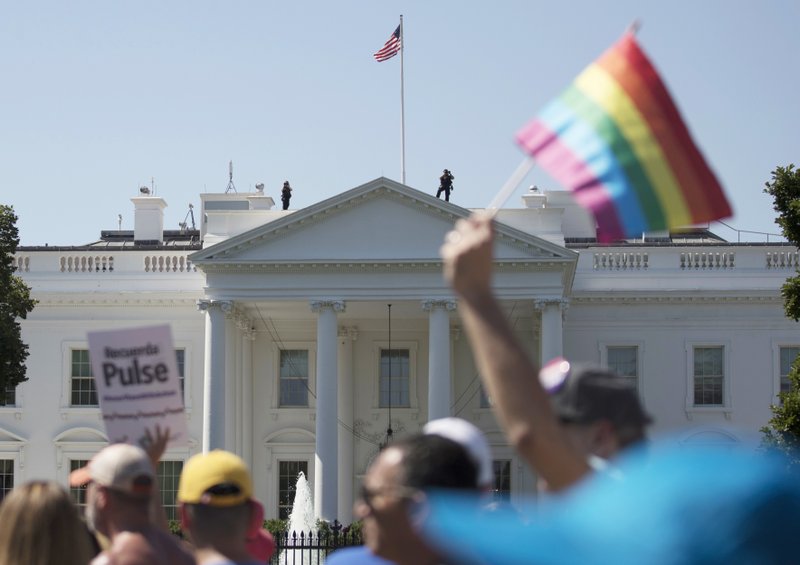WASHINGTON -- A federal judge on Monday temporarily blocked President Donald Trump's promised ban on transgender Americans serving in the armed forces, ruling that an earlier policy of inclusion must remain in effect.
U.S. District Judge Colleen Kollar-Kotelly ruled that the transgender service members who had sued over Trump's policy were likely to win their lawsuit. She directed a return to the situation that existed before Trump announced his new policy this summer, saying the administration had provided no solid evidence for why a ban should be implemented.
Trump had ordered a reinstatement of the long-standing policy that barred transgender individuals from joining the military. Service members who were revealed to be transgender were subject to discharge. Under President Barack Obama, that policy was changed last year to allow transgender people to serve openly.
The Trump administration may appeal Kollar-Kotelly's decision, but the injunction means Trump's policy cannot be implemented while the case is litigated. No trial date has been set.
[PRESIDENT TRUMP: Timeline, appointments, executive orders + guide to actions in first 200 days]
Kollar-Kotelly allowed to stand a part of the proposal that would bar federal health funds from being used for sex reassignment surgery. The administration has sought to prohibit such payments; Kollar-Kotelly said she didn't have jurisdiction to rule on the issue because none of the plaintiffs in the case established a likelihood of being affected by that prohibition.
In her ruling, Kollar-Kotelly said she was required to apply a greater degree of scrutiny to the government's plan because it affects a class of Americans that has traditionally lacked political power.
"As a class, transgender individuals have suffered, and continue to suffer, severe persecution and discrimination," the judge wrote. "Despite this discrimination, the court is aware of no argument or evidence suggesting that being transgender in any way limits one's ability to contribute to society."
Justice Department spokesman Lauren Ehrsam reiterated the department's view that the lawsuit in question was premature because the Pentagon was still in the process of reviewing how the transgender policy might evolve.
"We disagree with the court's ruling and are currently evaluating the next steps," Ehrsam said.
One of the attorneys handling the lawsuit, Shannon Minter of the National Center for Lesbian Rights, said the ruling was an enormous relief to his clients.
"Their lives have been devastated since Trump first tweeted he was reinstating the ban," Minter said. "They are now able to serve on equal terms with everyone else."
Trump announced on Twitter in July that the government "will not accept or allow transgender individuals to serve in any capacity in the U.S. Military," saying the military "must be focused on decisive and overwhelming victory and cannot be burdened with the tremendous medical costs and disruption that transgender in the military would entail." He followed with an August memo giving Defense Secretary James Mattis six months to come up with a policy on "how to address" transgender Americans who are currently serving. That policy was to be implemented by March.
Under the Obama administration, the Department of Defense had announced in 2016 that service members could not be discharged solely based on their gender identity. Transgender individuals were to be allowed to enlist in the military in June 2017, a timeline initially delayed under the Trump administration to Jan. 1, 2018.
Minter said the new court ruling means they will be able to enlist as of that date.
The Trump administration had asked the court to dismiss the lawsuit; Kollar-Kotelly refused to do so.
The lawsuit was filed in August on behalf of eight transgender individuals, including service members in the Air Force, Coast Guard and the Army, as well as students at the U.S. Naval Academy and in the ROTC program at the University of New Haven.
The Justice Department, in seeking the lawsuit's dismissal, said none of the plaintiffs had established that they will be affected by current policies on military service.
The advocacy groups that filed the lawsuit assailed that assertion. They highlighted the uncertainty facing Regan Kibby, the transgender Naval Academy student who -- because of Trump's action -- was unsure whether he would be able to join the Navy when he graduates.
Kollar-Kotelly said the plaintiffs clearly established that they would be harmed by the administration's directives. She also contended that the plaintiffs were likely to prevail in arguing that the directives were unconstitutionally discriminatory -- targeting transgender people without evidence that their service caused substantive problems for the military.
Other lawsuits challenging the directive have been filed in Seattle and Baltimore.
Oral arguments are scheduled Nov. 9 for the Baltimore lawsuit, which was filed by the American Civil Liberties Union on behalf of six transgender service members.
"The federal courts are recognizing what everyone already knows to be true: President Trump's impulsive decision to ban on transgender people from serving in the military service was blatantly unconstitutional," said Joshua Block, senior staff attorney with the ACLU.
The Pentagon has not released data on the number of transgender people currently serving, but a Rand Corp. study has estimated between 1,320 and 6,630 out of 1.3 million active-duty troops.
Information for this article was contributed by David Crary and Jessica Gresko of The Associated Press; by Justin Jouvenal of The Washington Post; and by Erik Larson of Bloomberg News.
A Section on 10/31/2017
